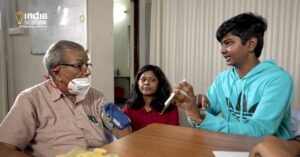Not Just Bones: Experts Explain How Vit D Deficiency Can Cause Heart Failure
A daily dose of sunshine is vital not just for the wellbeing of your bones but also your heart. Here’s why.

A daily dose of sunshine, which stimulates production of Vitamin D in the body, is vital not just for the well-being of your bones but may also be good for your heart.
The problem of vitamin D deficiency affecting bone health is well known for decades. For some years, scientists have also seen vitamin D deficiency as a factor that determines health of your heart. Now Indian researchers have deciphered how exactly vitamin D deficiency can cause heart failure.
The new study has shown that vitamin D deficiency alone can lead to heart failure, possibly through insulin resistance. It has found that cardiac insulin leads to functional deterioration of heart in animals with low vitamin D levels.
The utilization of glucose and fatty acids – key fuels for energy generation in heart – is adversely affected due to insulin resistance in heart cells. Insulin plays a critical role in regulation of cellular metabolism in many tissues in the body.
To study if vitamin D deficiency could cause cardiac damage similar to other risk factors like consumption of high fats and high calorie food, researchers designed an experiment with rats. They manipulated diets of animals and divided them into three groups – one with adequate vitamin D, second set had vitamin D deficiency, while the third group was fed with high fat and high fructose diet.
At the end of 20 weeks, it was found that the hearts of vitamin D deficient animals were failing. They showed molecular and functional changes similar to the hearts of rats in high fat high fructose diet group. “The cardiac dysfunction caused by vitamin D deficiency alone was very similar to that by the other risk factor – high calorie diet – sometimes even to a greater extent in some parameters. For example, cardiac inflammation was higher in vitamin D deficiency diet than high calorie diet,” researchers have observed in the study.
Researchers found greater expression of genes involved in enlargement of cardiac muscles. These findings were confirmed when scientists measured heart wall thicknesses, chamber internal diameters and contracting capacity of heart. Left ventricular posterior wall thickness was found to be increased in rats with vitamin D deficiency. This happens when cardiac workload increases and turns pathological if no remedial measures are taken, finally progressing to heart failure. In such condition, the pumping action of the heart can no longer meet the metabolic demands of the body.
“We have shown the link between vitamin D deficiency and cardiac dysfunction and how it may lead to heart failure. Vitamin D and its signalling modulate myocardial insulin sensitivity, the insufficiency of which induces impaired glucose utilization, remodeling response, and heart failure,” explained Dr Sanjay Kumar Banerjee, senior scientist at the Faridabad-based Translational Health Science and Technology Institute (THSTI), who led the research team, while speaking to India Science Wire.
The THSTI group, in its study in 2016 involving a South Indian population, had shown that low vitamin D levels were associated with diabetes as well as diabetes plus coronary artery disease. However, it had not provided any cause-effect relationship. “Our study now tackles exactly that issue with animal experiments and provides conclusive evidence,” Dr Banerjee added.
The new findings have both public health and therapeutic implications. The insights gained on how vitamin D signalling affects myocardial insulin sensitivity may help scientists design new drugs for management of heart failure by targeting activation of vitamin D receptor.
With vitamin D deficiency emerging as a risk factor for heart disease, public health policies will have to take note of it since metabolic disorders are already a major health challenge in India. “We have evidence to show that widespread vitamin D deficiency in Indians definitely contributes to insulin resistance and diabetes. Our previous research and ongoing work in Indian population have indicated that supplementation with vitamin D may help in ameliorating insulin resistance and decreasing blood glucose levels,” commented Dr Anoop Misra (National Diabetes Obesity and Cholesterol Foundation, New Delhi), who was not associated with the new study.
The research results have been published in scientific journal Molecular Nutrition and Food Research. The research team included Hina Lateef Nizami, Parmeshwar Katare, Yashwant Kumar and Sanjay Kumar Banerjee (Translational Health Science and Technology Institute, Faridabad); Pankaj Prabhakar, Subir Kumar Maulik, Sudheer Kumar Arava (All India Institute of Medical Science, New Delhi) and Praloy Chakraborty (VMMC and Safdarjung Hospital, New Delhi).
(Article Courtesy: India Science Wire)
Like this story? Or have something to share?
Write to us: [email protected]
Connect with us on Facebook and Twitter
This story made me
- 97
- 121
- 89
- 167
Tell Us More
We bring stories straight from the heart of India, to inspire millions and create a wave of impact. Our positive movement is growing bigger everyday, and we would love for you to join it.
Please contribute whatever you can, every little penny helps our team in bringing you more stories that support dreams and spread hope.



















